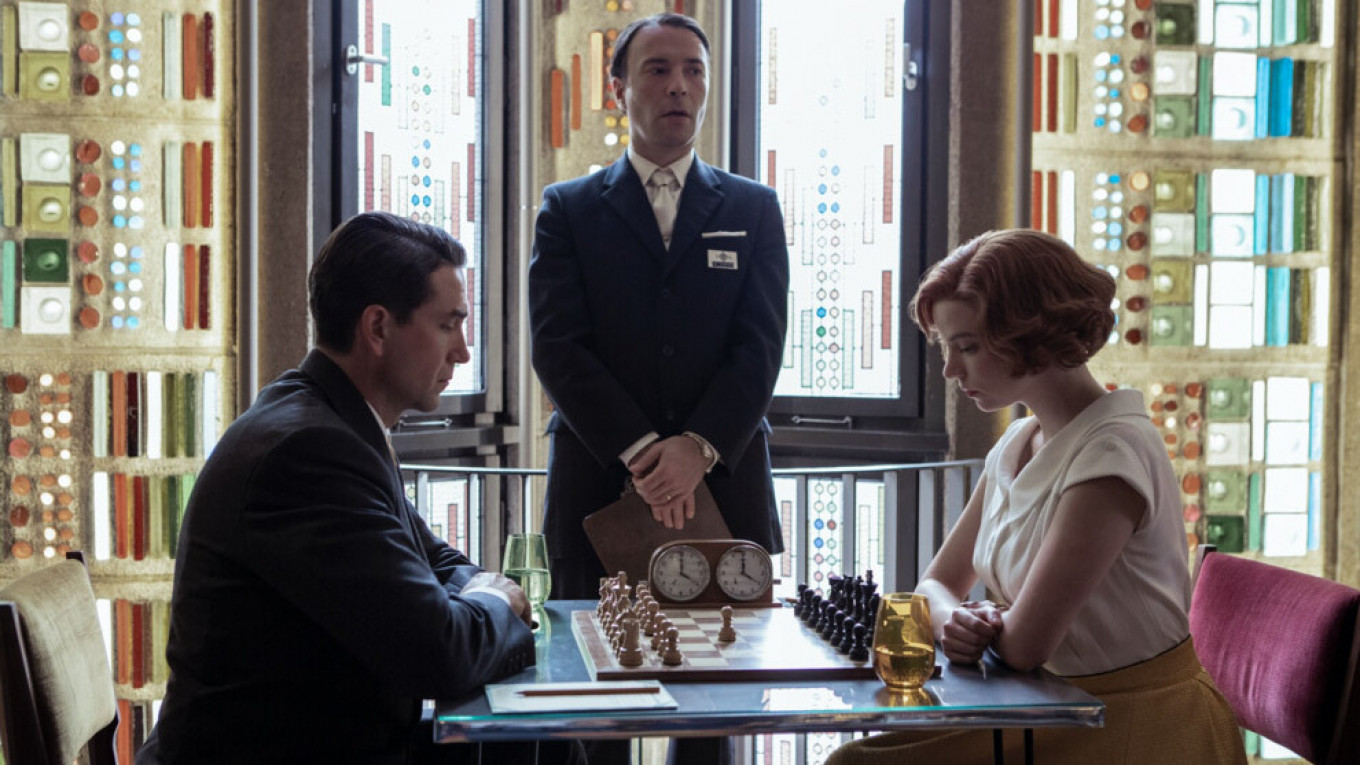Western audiences are in raptures over the series. Its rating on the authoritative IMDb website stands at 8.8 of 10 based on more than 100,000 responses. But in Russia, it elicits a mix of emotions — even though it portrays Russian chess masters as undeniable geniuses. It seems that the series has touched some deep chord of national identity that even many Russians didn’t know existed.
Keep in mind that Russians commonly believe that the West doesn’t much like them. They conclude, therefore, that the West is constantly offending, underestimating, overlooking, infringing on or oppressing them.
The same thing applies to cultural works. Hollywood consistently depicts Russia in a negative light. This vast and beautiful land becomes a gray and gloomy desert in which alcoholics wearing fur earflaps line up at Lenin’s mausoleum, or else all Russians are reduced to shady hackers, mafia members or spies — and sometimes, all three at once.
The archetypal caricature of a Russian is the boxer Ivan Drago from the “Rocky” films. A huge, dimwitted and insensitive “refrigerator” of a man, Drago appears to be invincible. However, he is doomed to defeat because, as everyone knows, democracy and the market economy are better than communism and the Gulag
In fact, the creators of “The Queen’s Gambit” parody this hackneyed cliché by showing what appears to be a CIA operative tell the main character that a victory over the Soviet chess masters is a victory for the American way of life — but only succeeds in making himself and his ideology look ridiculous.
In this, the filmmakers break with tradition. The main character couldn’t care less about the CIA and its geopolitical intrigues. She holds the Soviet chess masters in high esteem. She respects their talent and intelligence, having grown up studying their moves and strategies.
The Russian chess players are not depicted as soulless robots or ruthless killers, but as ordinary “people like us.” And this is the second break with tradition.
Most Russians were knocked completely off guard to see not only chess players, but also ordinary Soviet citizens shown as “people like us.” These Soviets are even happy for the American chess player’s victories and ask for her autograph.
In fact, the Moscow we see in “Queen’s Gambit” bears greater resemblance to the intellectual monastic order from Hermann Hesse’s “The Glass Bead Game” than it does the heart of the Evil Empire. These Muscovites seem to have no other desire but to play chess with each other all day long and engage in various intellectual pursuits.
Western audiences understand that this is not a documentary — the book underlying the story was itself only partially based on the biography of Bobby Fischer — and, accordingly, see it more as fairytale. Some Western critics even compare it to “Alice in Wonderland.” Many Russians, however, failed to note the artistic license taken and have been pouring over every detail of the series with a magnifying glass as though it were some sort of archival footage. They spot a fragment of the Cathedral of Christ the Savior showing, a building that had been blown up prior to that period, and shout, “Aha! We knew it. A mistake!” They also love to point out that Soviet stewardesses dressed differently.
Why do they feel compelled to point out flaws in TV series anyway?
The truth is, Russians were simply unprepared to see themselves portrayed as “good guys.” They were expecting to be shown as worse, less intelligent, angrier or more depressing than Westerners. In short, they were ready for anything but this.
But the filmmakers went and portrayed Russians as “people like us.” They showed a world where the CIA is almost as unpleasant as the KGB and ordinary people, regardless of the citizenship shown on their passports, sit down at outdoor tables and play chess with each other. And it is at a chessboard rather than a military briefing room or battlefield that the series reaches its emotionally powerful crescendo
What’s more, the Russians in “The Queen’s Gambit” come off as even better than they actually were. Average Soviet citizens, from the boys on the street to chess fans carrying autograph books, are shown as amiable and kind-hearted people bordering on saints who are ready to cheer on a foreign chess player who beats their compatriot — however rarely such qualities are to be found in real life, if they are to be found at all.
After so many years of complaining that Hollywood portrays Russians unfairly, now that they are shown to be not only good guys, but almost impossibly good, what’s a patriotic and dutifully suspicious Russian to do?
At this point, the Russian psyche’s instinct for self-preservation kicked in, with the intelligentsia on Facebook quickly concluding that the American cinema had tilted too far left and wants Joe Biden to build Marxism in the U.S. That’s why they portray Russians this way: it has nothing to do with Russia at all. I’m not kidding, this line of reasoning is very popular. And these same people would then add with a sigh, “Too bad Trump didn’t tell them to show Russians in a positive light.”
And this is a shame. The problem is not that “The Queen’s Gambit” portrays Russians incorrectly — it doesn’t. The fact is simply that Russians always find a way to be dissatisfied, even when nothing is wrong.
A Message from The Moscow Times:
Dear readers,
We are facing unprecedented challenges. Russia's Prosecutor General's Office has designated The Moscow Times as an "undesirable" organization, criminalizing our work and putting our staff at risk of prosecution. This follows our earlier unjust labeling as a "foreign agent."
These actions are direct attempts to silence independent journalism in Russia. The authorities claim our work "discredits the decisions of the Russian leadership." We see things differently: we strive to provide accurate, unbiased reporting on Russia.
We, the journalists of The Moscow Times, refuse to be silenced. But to continue our work, we need your help.
Your support, no matter how small, makes a world of difference. If you can, please support us monthly starting from just $2. It's quick to set up, and every contribution makes a significant impact.
By supporting The Moscow Times, you're defending open, independent journalism in the face of repression. Thank you for standing with us.
Remind me later.








